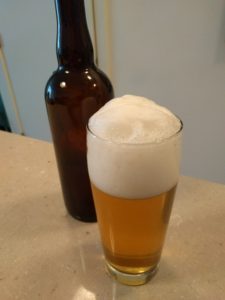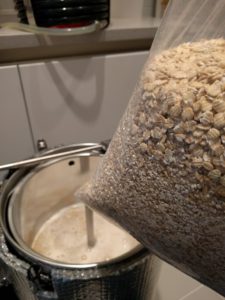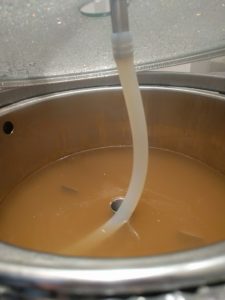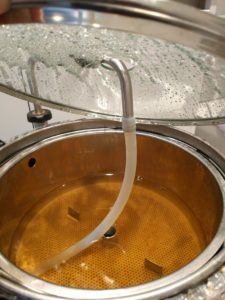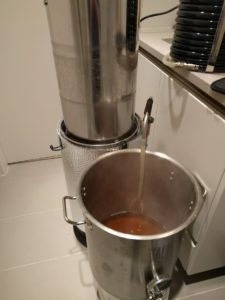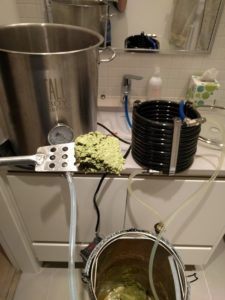Parti-gyle Brew: Euka and Zoa
Date Brewed: Nov 19, 2016
This was my first foray into parti-gyle brewing. The common grist is being used to product a brett saison with the higher gravity portion and a Belgian table ale with the lower gravity portion. Performed on the Grainfather, I drew off first runnings after only a small fraction of the sparge water had been run through the grain bed into a separate pot and boiled that on the stove-top. Then I used the remainder of the sparge water to fill the Grainfather with enough runnings for the small beer. Full details of the process are below.
74% Bohemian Pilsner malt (9.25 lb)
12% Wheat malt (1.5 lb)
8% Flaked wheat (1 lb)
4% Munich II malt (0.5 lb)
2% Acidulated malt (0.25 lb)
Hopping:
Willamette (details forthcoming)
Zoa Details: OG: 1.035 FG: 1.002 IBU: 32 ABV: 4.3% 90% WY3711, 10% WLP550
Euka Details: OG: 1.058 FG: 1.000 IBU: 30 ABV: 7.6% 75% WLP550, 25% WY3711, Yeast Bay Lochristi secondary 4 months
The mash was carried out at 155F in order to try to keep some residual sugar in the wort. This will help the grisette keep some body and flavour, and will help the saison keep some food for the brett to eat over the next 6 months.
Brew Day Notes
Mash started at 11:45am at 155F, 5.5 gallons. Using Grainfather, so just set temp to 155 and let it adjust after grain was stirred in. Dipped to 151F during start of recirculation but bounced back within 5 minutes. Checked gravity at 12:40pm, 1.056 at 112F (1.o65 corrected). Higher than I expected but I don’t really know what I’m going to get on sparge. Minus grain absorption, expecting 4 gallons at this gravity. Mashed out at 170F for 10-15 minutes. Realized I hadn’t heated sparge water, oops! 4.5 gallons sparge water heated until it was north of 160F.
Before sparging, pulled just under 3 gallons into secondary kettle. A bit more than I expect to be needed but I can blend them to be closer in gravity, not farther. Got that heating on the stove top while sparging with 4.5 gallons into the Grainfather. Once the grain was drained I had about 5 gallons in the GF, so I pulled about 0.6 gallons from the stove-top boil (now boiling) and replenished about 0.4 gal of that with water. I didn’t check final pre-boil gravities after this change, but stove-top was 1.062 and GF was 1.029 before the adjustment.
Boil started at 1:55pm on the stove-top (big beer) and 2:10pm on the Grainfather (small beer). Added 90m addition of 0.33oz Willamette to big beer and 0.66oz Willamette to small beer. Targeting about 25 IBU on the big beer so the Lochristi characteristics will shine, and 30 IBU on the small beer. Boil was quite vigorous on both kettles. Added second hop addition at 3:35pm with the intention that it will boil about 30 minutes in the big beer and 10 minutes in the small beer – since the stove-top will keep boiling while I chill and transfer the small beer from the Grainfather.
Circulated the wort chiller for 10 minutes without cooling water to sterilize, then chilled. Transferred to fermentor at appoximately 65F. Collected 4.3 gallons of 1.039 wort – a bit low on volume and high on SG. Topped up to 5 gallons with boiled and cooled water. Transferred the big beer to the GF afterwards (after removing a couple scoops of hop residue) and hit the chiller again. The ~120 minute vigorous boil reduced volume a lot more than expected, and gravity was very high as a result. Collected a measly 1.8 gallons at a huge 1.080 SG. Topped up with boiled and cooled water to 2.5 gallons.
I then hit both Brew Buckets with 30 seconds of pure O2 each, and then proceeded to make the biggest bone-head move possible – I pitched the White Labs Belgian ale yeast into the 3 gallon Brew Bucket instead of the French Saison yeast it was supposed to get. Well… guess I am putting the 3711 into the small beer. So the final beers are not going to be what I originally envisioned. I quickly re-tooled my plan, and I think I’ll transfer a blend of each to the glass carboy I plan to pitch the Lochristi blend into. Likely it will be the full volume of the Belgian ale (which will be around 7% I think) and top up with the table saison. The table saison is going to be a different character than I wanted since it’s now going to have the spicy character of the 3711 but hopefully it’ll be good.
So in the end I have 5 gallons of 1.034 wort being fermented by WY3711 and 2.5 gallons of 1.058 wort being fermented by WLP550. The decision of what goes into the 3-gallon glass carboy for a Lochristi brett secondary will be decided post-fermentation.
Photos
Mashing in with flaked oats in the mix.
The wort after 5 minutes or so of re-circulation. Starchy and cloudy.
The wort after about 45 minutes of re-circulation, very clear.
Transferring first runnings to a secondary kettle for the ‘big beer’ portion.
Clearing some trub out before transferring the stove-top boiled beer to the freshly emptied Grainfather so I can run it through the chiller.
Tasting / Fermentation Notes:
[24hr update] The wort for each was chilled to about 65F and allowed to free rise to 72F (room temp) ambient. The WLP550 took off after 10 hours and has been bubbling feverishly up to now (24h). The 3711 was not too far behind, getting going quick but not picking up the pace until about 15-16 hours in. It hasn’t hit the intensity of the 550, but is bubbling plenty steadily (60+ bubbles per min, whereas the WLP550 is easily 100+).
Furthermore: WLP550 actually started to blow off slightly on day 2/3 despite a full gallon of headspace on 2.5 gallons of wort. Pretty serious stuff.
Dec 3, 2016 – Racked a blend of 75% Euka (the stronger, Belgian ale) and 25% Zoa (table saison) into a 3-gallon glass carboy and pitched The Yeast Bay’s Lochristi brett blend. Bottled the remainder (about 3 gallons, with about half a gallon being the stronger Belgian ale) into 18 x 750mL bottles with 3.4 oz corn sugar. The table saison finished at 1.002 and the Belgian ale at 1.010. The table saison tasted nice but very weak, as expected. The Belgian ale is highly phenolic with spice on the finish and a bit of banana, oddly. We’ll see how that one ages out.
Dec 18, 2016 – Drank a bottle of the table saison blend. It is quite surprising how much the character of the Belgian ale comes through, despite being by far the smaller component. Much more full-bodied than expected as well, considering it is only about 4%. Lots of Belgian esters and phenols which push it out of the typical saison realm but a pleasurable enough beer to drink!
Feb 19, 2017 – Zoa (the table saison) is tasting good. Quite a phenolic Belgian character with light malt and balanced bitterness. Carbonation is strong but not too strong, giving the beer a lively feel without gushing or being tough to pour.
Mar 26, 2017 – Gravity sample and bottling prep for Euka. Down to 1.000, as I’d hoped. Tasting nice – gooseberry white wine character, some orange stone fruit character, and little to no funk at the moment.
Jun 6, 2017 – First bottle of Euka. Quite heavy on the apple skin character, not in a bad way but it’s drinking a bit cidery. Grainy beyond that and a bit of diacetyl at the moment.

